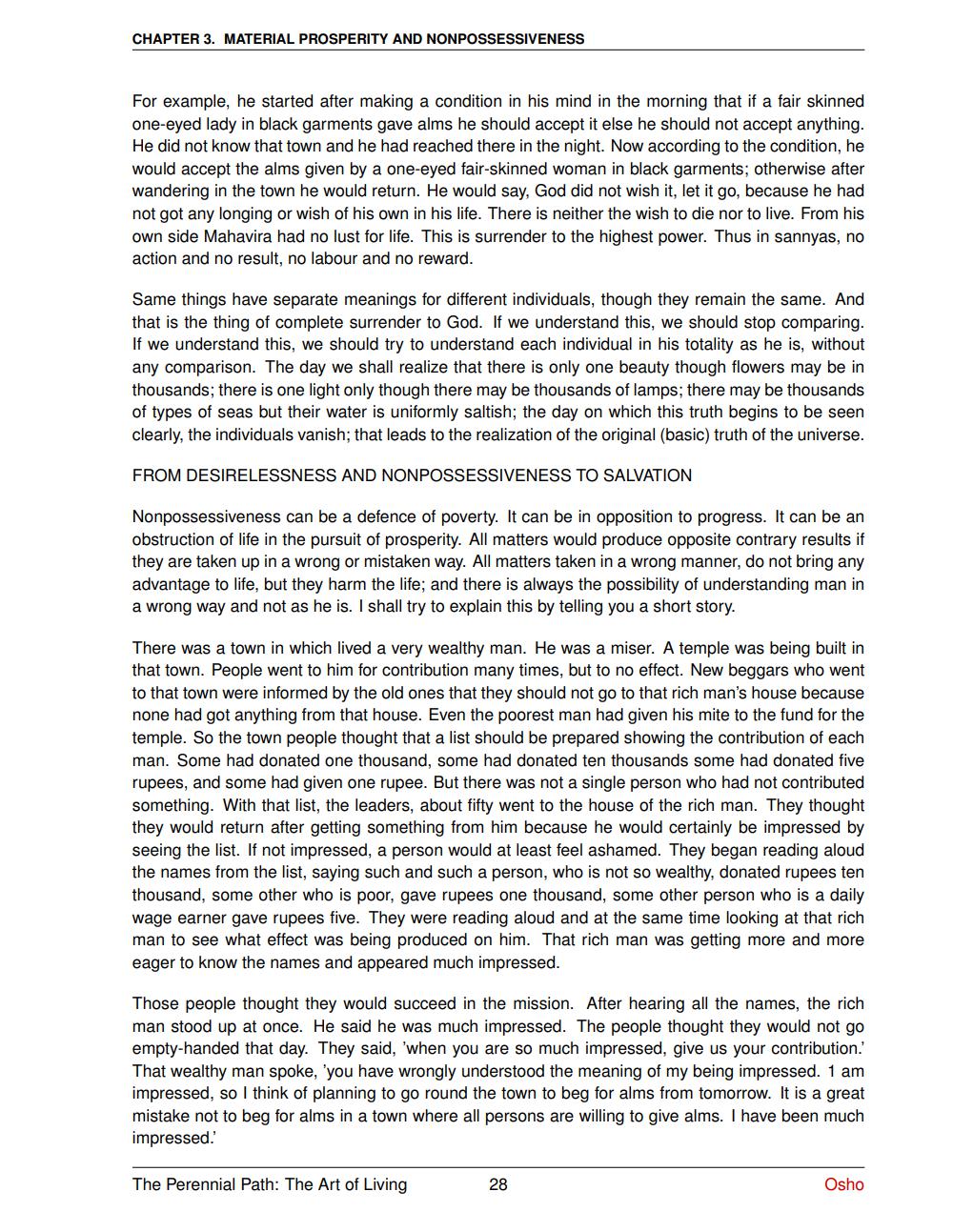________________
CHAPTER 3. MATERIAL PROSPERITY AND NONPOSSESSIVENESS
For example, he started after making a condition in his mind in the morning that if a fair skinned one-eyed lady in black garments gave alms he should accept it else he should not accept anything. He did not know that town and he had reached there in the night. Now according to the condition, he would accept the alms given by a one-eyed fair-skinned woman in black garments; otherwise after wandering in the town he would return. He would say, God did not wish it, let it go, because he had not got any longing or wish of his own in his life. There is neither the wish to die nor to live. From his own side Mahavira had no lust for life. This is surrender to the highest power. Thus in sannyas, no action and no result, no labour and no reward.
Same things have separate meanings for different individuals, though they remain the same. And that is the thing of complete surrender to God. If we understand this, we should stop comparing. If we understand this, we should try to understand each individual in his totality as he is, without any comparison. The day we shall realize that there is only one beauty though flowers may be in thousands; there is one light only though there may be thousands of lamps; there may be thousands of types of seas but their water is uniformly saltish; the day on which this truth begins to be seen clearly, the individuals vanish; that leads to the realization of the original (basic) truth of the universe.
FROM DESIRELESSNESS AND NONPOSSESSIVENESS TO SALVATION
Nonpossessiveness can be a defence of poverty. It can be in opposition to progress. It can be an obstruction of life in the pursuit of prosperity. All matters would produce opposite contrary results if they are taken up in a wrong or mistaken way. All matters taken in a wrong manner, do not bring any advantage to life, but they harm the life; and there is always the possibility of understanding man in a wrong way and not as he is. I shall try to explain this by telling you a short story.
There was a town in which lived a very wealthy man. He was a miser. A temple was being built in that town. People went to him for contribution many times, but to no effect. New beggars who went to that town were informed by the old ones that they should not go to that rich man's house because none had got anything from that house. Even the poorest man had given his mite to the fund for the temple. So the town people thought that a list should be prepared showing the contribution of each man. Some had donated one thousand, some had donated ten thousands some had donated five rupees, and some had given one rupee. But there was not a single person who had not contributed something. With that list, the leaders, about fifty went to the house of the rich man. They thought they would return after getting something from him because he would certainly be impressed by seeing the list. If not impressed, a person would at least feel ashamed. They began reading aloud the names from the list, saying such and such a person, who is not so wealthy, donated rupees ten thousand, some other who is poor, gave rupees one thousand, some other person who is a daily wage earner gave rupees five. They were reading aloud and at the same time looking at that rich man to see what effect was being produced on him. That rich man was getting more and more eager to know the names and appeared much impressed.
Those people thought they would succeed in the mission. After hearing all the names, the rich man stood up at once. He said he was much impressed. The people thought they would not go empty-handed that day. They said, 'when you are so much impressed, give us your contribution.' That wealthy man spoke, 'you have wrongly understood the meaning of my being impressed. 1 am impressed, so I think of planning to go round the town to beg for alms from tomorrow. It is a great mistake not to beg for alms in a town where all persons are willing to give alms. I have been much impressed.
The Perennial Path: The Art of Living
28
Osho




